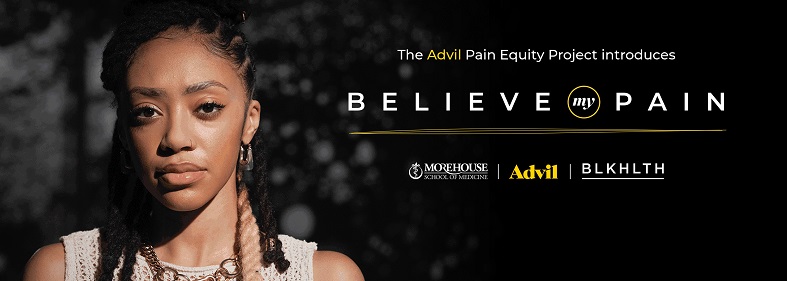83% of Black Americans Have Had a Negative Experience When Seeking Help for Managing Pain. A New Equity Project Aims to Change That
Advil is awarding grants to Morehouse School of Medicine and BLKHLTH to support the development of patient resources and a course for medical school students to address pain equity both in and outside of medical facilities.
By L'Oreal Thompson Payton, Fortune.com
Pain is a universal human experience, but how that pain is treated can depend on a few factors, such as where you live, how much money you make, and the color of your skin. According to a study, three out of four Black people believe there is bias in how their pain is diagnosed. Now Advil, a popular pain relief brand, is aiming to address inequity in pain diagnosis and treatment with the Advil Pain Equity Project.
As part of the multiyear project, Advil is awarding grants to Morehouse School of Medicine and BLKHLTH, an Atlanta-based nonprofit, to support the development of patient resources and a course for medical school students to address pain equity both in and outside of medical facilities. The tools and resources are available at BelieveMyPain.com.
In a survey of 2,000 Americans conducted by Advil in collaboration with Morehouse School of Medicine, 93% of Black individuals said pain has an impact on their day-to-day life and, furthermore, 83% said they have had a negative experience when seeking help managing pain.
These stats are daunting and disturbing, which is why author, physician, and thought leader Dr. Uché Blackstock, founder of Advancing Health Equity, is committed to dismantling racism in health care and closing the gap in racial health inequities.
“If pain goes untreated, people experience physical, emotional, and psychological distress. They are not able to enjoy activities of daily living, like spending time with family and friends. They are unable to go to work and cannot pay their bills,” says Blackstock. “Even worse, they likely have a diagnosis that is being missed or delayed that could potentially harm them or ultimately result in their death. Pain inequity is an issue that disproportionately affects Black people, and immediate action needs to be taken to address this crisis.”
Health disparities in the Black community
Pain inequity is just one example of health disparities in the Black community. In addition to higher rates of infant and maternal mortality, Black Americans experience greater incidents of high blood pressure, Alzheimer’s disease, and other illnesses.
“There are very deep roots to pain inequity in Black communities. The roots are historical and systemic. They stretch back to slavery, a societal institution that was based on and perpetuated the notion that Black people were biologically inferior to other races,” explains Blackstock, pointing to enslaved people who were experimented on—without their consent—for the sake of medical advancements. “They were put on display in medical school lecture halls, and even textbooks included myths that Black people were biologically different. Those notions and myths have been perpetuated for centuries and still infiltrate our medical education curricula.”
Forging a new way forward
In order to improve access to pain relief for Black patients, Blackstock says that health care providers and institutions must recognize their personal and systemic biases, respectively, and how these biases detrimentally impact the health and well-being of their Black patients.
“We know that the next generation of health professionals holds the key to changing how we care for patients,” she says. “Also, continuing medical education and training for practicing health professionals around pain inequity will be key…institutions must implement clinical protocols and processes to track pain inequity in practice and intervene when necessary. They must hold themselves accountable.”
To aid with changing the narrative, the Advil Pain Equity Project includes a storytelling campaign titled Believe My Pain, to help shed light on the experiences of Black patients. The campaign includes a digital roundtable discussion with Blackstock; five members of Black communities who shared their personal experiences with inequitable pain diagnosis and treatment; as well as author and advocate Elaine Welteroth, who has spoken out about her experience with racial bias in the health care system as a new mom.
“I experienced a condition called symphysis pubis dysfunction early on in my pregnancy, and I was experiencing this excruciating pain in my pelvis that made it really hard to walk, let alone get out of bed,” Welteroth recalls. “I had a really hard time finding a doctor that made me feel safe and listened to me.”
The experience led Welteroth to break away from the modern health care system and hire a Black midwife to guide her through a painful pregnancy and, later, a successful at-home delivery. In sharing her story, Welteroth is optimistic that it will inspire and encourage other people to advocate for themselves and their needs as well.
“Believe your body,” she says. “If you’re not getting the care you need, seek it out elsewhere. Don’t give up. Don’t settle for health care that doesn’t feel like care.”


